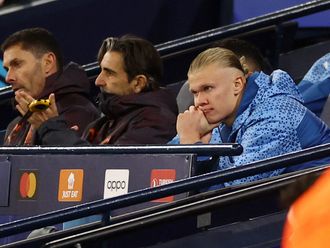Tokyo: Japanese J-League side Gamba Osaka has apologised after a flag reportedly bearing markings similar to those of the Nazi SS was displayed during a recent match.
Gamba supporters were seen waving a flag with the markings “very similar to the symbol” of the Nazi paramilitary organisation in the form of a double S during a game on Sunday, team spokesman Kenji Okunaga told AFP on Friday.
“We apologise to our supporters, fans and many others for causing discomfort,” Gamba said on its website on Thursday, pledging it “will take strict measures once we find out” who was responsible.
“We are talking with people who are believed to have displayed the flag, but we’ve not yet identified who did it,” Okunaga said, declining to elaborate on what kind of measures the team may take.
The incident came after the J-League in 2014 ordered the Urawa Red Diamonds, one of its teams, to play in an empty stadium as punishment for a “Japanese only” banner that fans displayed during a match in Tokyo.
The J-League prohibits displays of any kind linked to political ideology, religion or race and also bans racial and other forms of discrimination.
The waving of the flag by Gamba supporters was reported to a team official after the game at opponent Cerezo Osaka, and Gamba confirmed it.
But the team said Sunday’s case was similar to a previous incident, which took place several years ago.
Then Gamba Osaka only issued a warning to the supporter group that displayed it as it was determined there was no political intention behind it, the team said on the website.
But the repeat offence Sunday “can never be tolerated and is extremely regrettable”, Gamba said.
Periodic actions and comments in Japan deemed anti-Semitic have drawn controversy and international criticism, though ignorance rather than malicious intent has usually been blamed.
Last year, Sony Music and the producer behind a Japanese girl band apologised for having the singers perform in military-style costumes resembling Nazi uniforms.
And rock band Kishidan angered the Simon Wiesenthal Center in 2011 when they wore a costume the Jewish human rights organisation said resembled a Nazi uniform.











